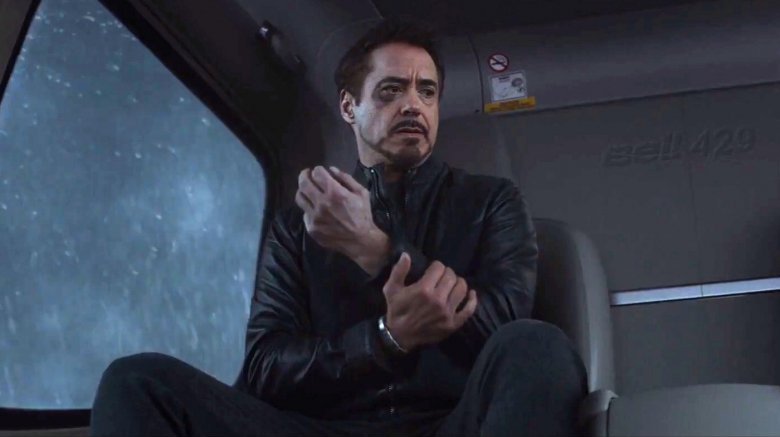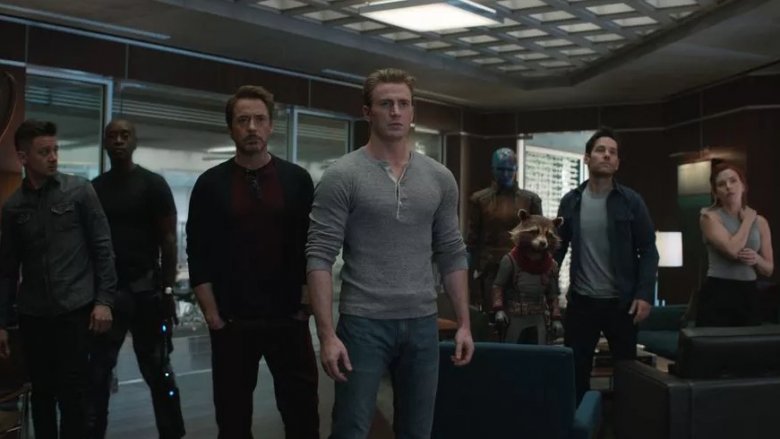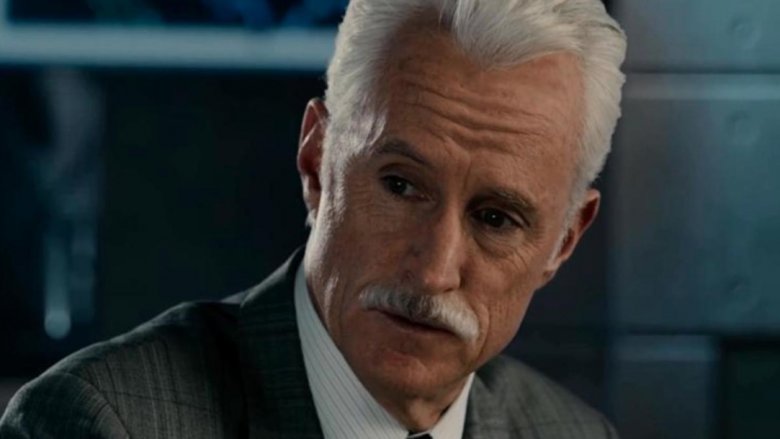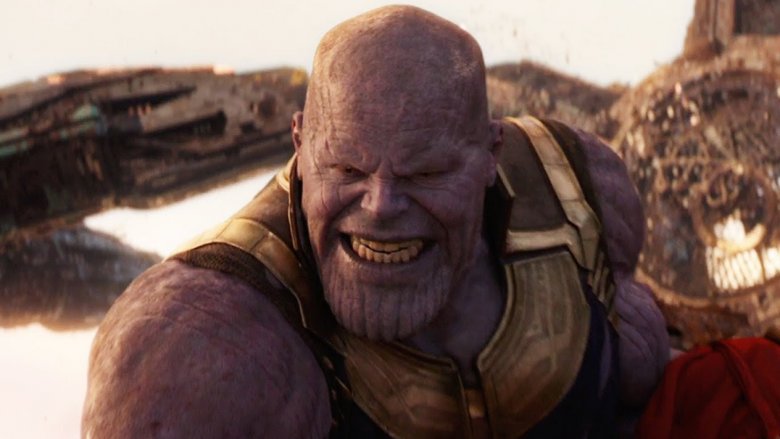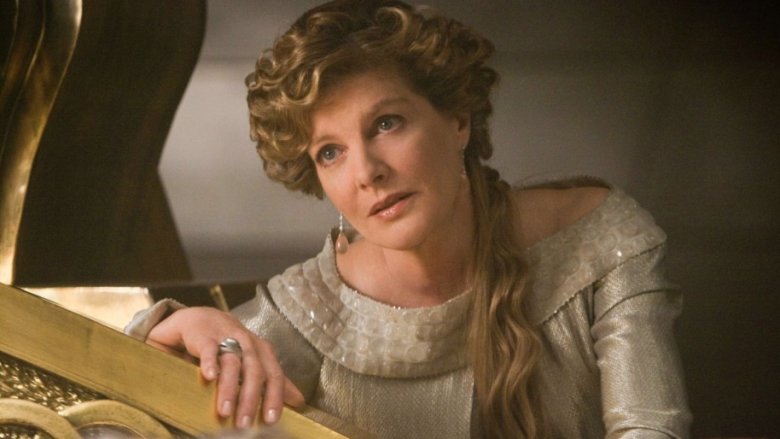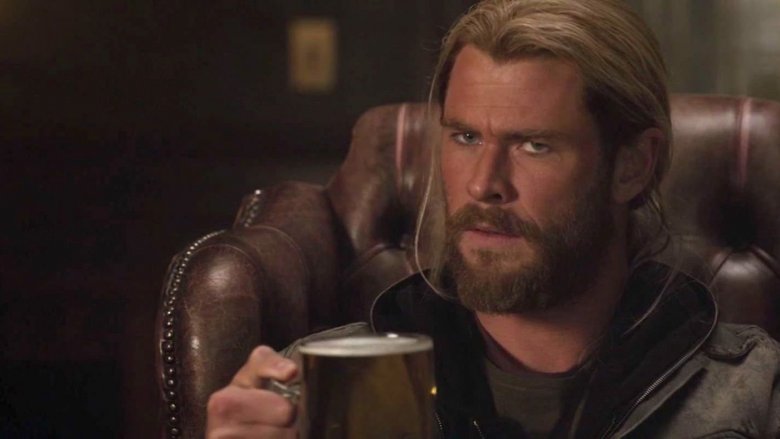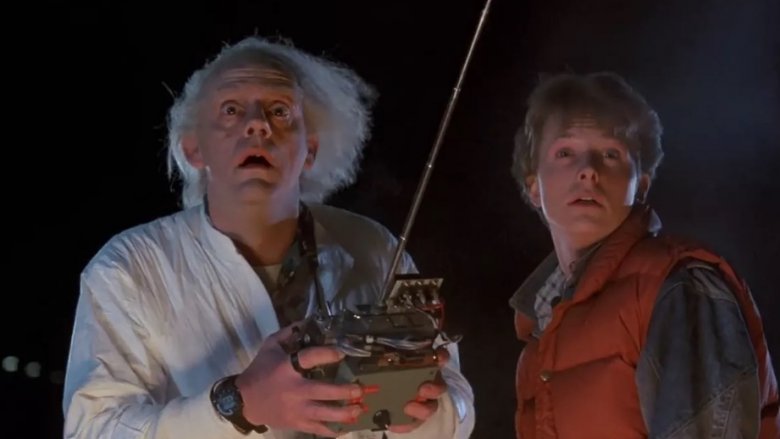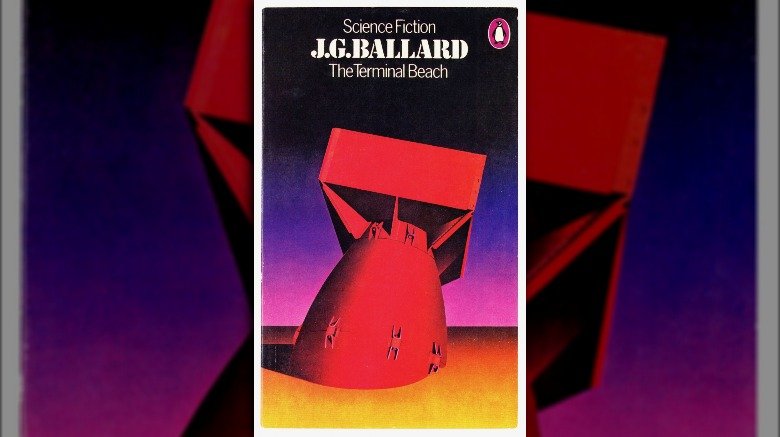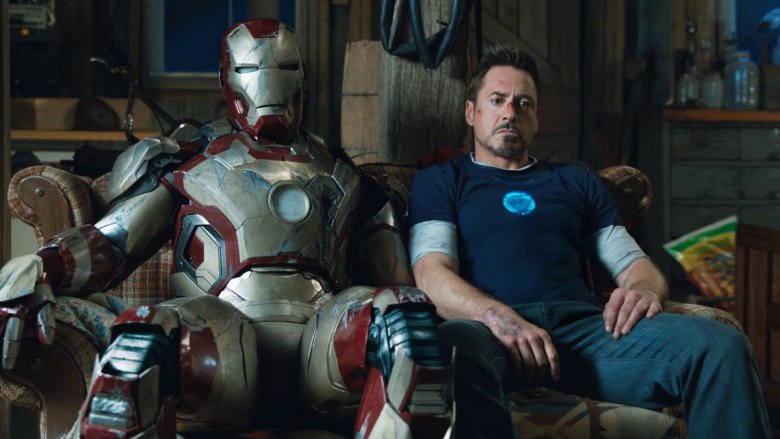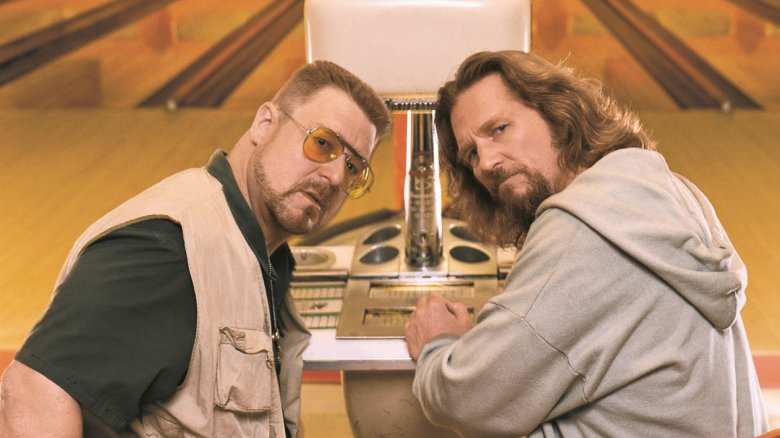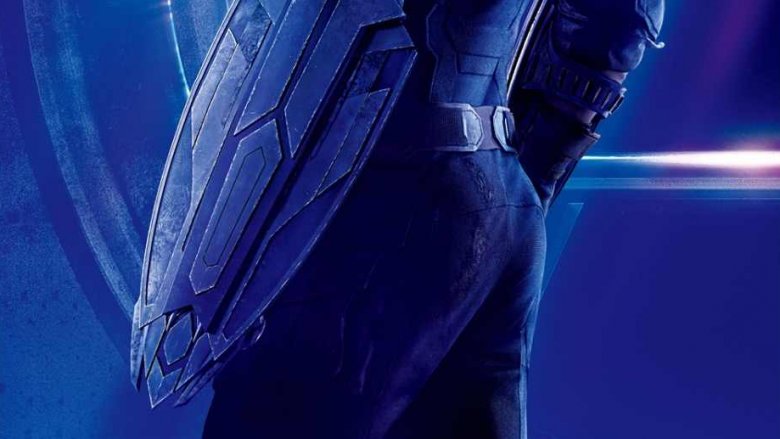Things In Avengers: Endgame Only Adults Notice
Like all Disney movies, Avengers: Endgame threads the needle between age groups, appealing both to young children and to older adults. That's just the makings of a great box office to start with; there's a reason that some of the highest-grossing movies of all time have been PG-13 or lower. When you make room for the younger crowd, that tends to translate to more money in the long run.
But while the kids might crowd the movie theater, there's plenty going on behind the scenes for adults in the know. In the words of Andy Daly's immortal Don DiMello, it's got "a little something for daddy." For the kids, there are the stories of colorful heroes wielding their immense powers for good, with plenty of jokes along the way. For the adults, there are larger themes of grief, adults-only shout-outs to popular culture, and metatextual jokes that are likely to fly right over kids' heads (no matter how fast their reflexes might be). Obviously, spoilers are ahead.
Coping with loss on a grand scale
After the five-year time jump early in the film, we see Captain America leading a grief counseling group meant to help people move on after Thanos' snap. With half the living creatures in the universe gone (and untold more dead after presumably half of all doctors, pilots, and drivers all got dusted in the middle of what they were doing), there are a lot of issues left unresolved.
Cap has clearly dealt with it by marinating in it, leading a group therapy session seemingly to stay in touch with the persistent heartbreak. Natasha has thrown herself into her work, Tony Stark has retired to a cabin in the woods, and Hulk has become a happy-go-lucky celebrity. All the surviving Avengers are struggling to move on after the weight of a crushing, genocidal loss that's beyond alien to most kids. Adults, on the other hand, are more likely to key into what are obviously some largely unhealthy coping mechanisms for the Avengers' loss. Of them all, Tony is the closest to moving on in a healthy way, but he's done so by moving as far into the country as he can so as to never engage with the wreckage of his biggest heartbreak. He's deep in denial, to the point where he kicks the Avengers out when they try to convince him there's a chance to make things right.
Fatherhood issues for decades
It wouldn't be an exaggeration to say that both Avengers: Infinity War and Avengers: Endgame are built on father issues. You've got the ultimate abusive big dad in Thanos, who tells everyone he meets that his genocidal warpath is all for the good of the people he's killing; that he's actually being the good guy by doing the bad thing for the right reasons. Then you've got Tony Stark, who struggles with being a father figure for Peter Parker, and for whom the latter's death weighs heavily enough in Endgame to lead Tony to undertake a mission through time to bring Spider-Man back. Thor often struggles and bristles under the weight of his father's expectations.
Basically, a lot of the Avengers are working through their dad issues, which is crystallized in a long moment of Tony talking to his father, Howard Stark, while on a trip through time in the 1970s. Tony manages to have a pretty in-depth heart-to-heart with his old man, even though Howard has no idea that he's actually talking to his son. Tony finally gets to work through some of his feelings and admit that Howard was a pretty good dad underneath it all. It's the kind of perspective that you're not likely to get until you're well on your way to becoming a dad yourself.
Thanos, the ultimate bad dad
There's no greater subtext pointing toward characters dealing with father issues than Nebula's struggle to extract herself from Thanos' control. The present version of Nebula is literally battling against a past version of herself, one still warped and manipulated by Thanos' influence. It's an influence that kept her and Gamora at each other's throats for years, an influence that took years of hard work and counter-programming to get over ... and one that she's still not free of.
When she's taken over by the past version of Nebula's cybernetic implants, it's a figurative manifestation of the struggle that many real people do to escape abusive relationships. That it all culminates in the present Nebula literally killing the past version of herself makes sense. As Kylo Ren says in a rare wise moment in Star Wars: The Last Jedi, "Let the past die. Kill it if you have to." It's a subtext that most kids aren't going to pick up on in the moment, but to adults, Nebula's journey of transformation will read plenty familiar.
One last conversation with mom
When Thor and Rocket go back to Asgard to get the Reality Stone, the God of Thunder pretty immediately gets sidetracked when he sees his mother, Frigga. Thor remembers that the day they're visiting Asgard is the same day his mother dies in the past, which brings up some understandably complicated emotions for him. Frigga finds him, however, and they're able to have one last loaded conversation about family, the future, and the burden of expectations.
It's the kind of perfect last conversation that many adults wish they could have with their parents before they've passed. That level of melancholic fantasy isn't common for most kids, thankfully, and the opportunity for Thor to have one last chat with his doomed mother likely put more than a few adults in the audience to tears. Real people don't have the ability to go back in time and get closure with their parents, but plenty have dreamed of the chance.
Thor's beer gut and the prevalence of fat jokes
While Captain America has been leading therapy sessions, and Natasha has been leading superhero teams, Thor has been leading New Asgard ... at least in terms of alcohol consumption. The massive amount of alcohol Thor's been drinking has given the God of Thunder a bit of a beer gut, which leads to copious amounts of fat jokes throughout the rest of the movie. Kids may or may not recognize that Thor's newly rotund figure is a product of beer drinking, and they certainly aren't going to clue into the problematic nature of basing a movie's entire subplot around a bunch of outdated fat jokes.
While it's a lazy way to show that Thor has basically been out of it for the last five years of story, it's a particularly mean-spirited plot line especially when weighed against the last few years of pop culture espousing greater sensitivity regarding body positivity. Volstagg is the Lion of Asgard in Marvel comics, and he's done plenty of heroic things all when he was twice Thor's Endgame size. You'd think we'd be past this joke by now.
The cavalcade of time travel movie references
When it comes to time travel in movies, it almost never makes sense for very long. Most of the time, these movies just kind of ask you to accept the basic concept and ignore anything weird that happens later. Endgame, however, spends a lot of time calling out various misconceptions about how time travel works in the MCU, from Deutsch to the grandfather paradox. Movies get involved when Rhodey and Scott Lang list off some of their favorite time travel movies: Back to the Future, Hot Tub Time Machine, Bill & Ted's Excellent Adventure, Star Trek, Somewhere in Time, Quantum Leap, Time Cop, and The Terminator.
Most kids aren't going to have seen more than a couple of movies on the list, and they rattle them off so quickly that even adults might have trouble keeping up. Still, even if you were quick enough to recognize the films and remember each one's specific rules regarding time travel, it doesn't matter. Hulk pretty quickly shuts Rhodey and Scott down immediately by telling them that they're all wrong.
The Terminal Beach
After Scott finally escapes the Quantum Realm thanks to an accidentally helpful rat, he has to alert a security guard to let him and his Quantum Realm doohickeys out of the storage space they're being held in. That security guard is played by none other than Ken Jeong, a comedian and actor arguably best known for leaping out of a car trunk naked in The Hangover. The cameo alone might be enough to mention here, but there's one more detail in that scene that's just for adults.
The security guard is reading J. G. Ballard's The Terminal Beach, a collection of science-fiction short stories. Like many of Ballard's other works, The Terminal Beach explores the Oedipal complex, man's inherent capacity for destruction, and the disillusionment of man when exposed to wonder for too long. Cool hidden reference! But there's a more on-the-nose detail hiding in those pages. One of the most famous stories in The Terminal Beach is called "End-Game." It doesn't bear many similarities to Endgame, but the shared title is certainly no coincidence.
Kids says the darnedest things
Early in the film, audiences get a good look at how Tony Stark has, somewhat surprisingly, become a pretty good dad to his young daughter, Morgan. In fact, he runs down all the expected events of a parent's life with a young child: reminding them to come in for lunch when they're too busy playing outside, putting them to bed when they've stayed up too late, and, of course, desperately trying to keep the other parent from finding out when you've accidentally cussed in front of the kid and they've suddenly found a new favorite word to say.
It's an eminently relatable moment when Morgan starts cussing up a storm just to get a rise out of her dad, and something just about every parent in the theater can relate to. Iron Man might be able to build nigh-magical forms of technology and stop a rampaging Titan, but not even the power of the Infinity Gauntlet can keep kids from saying whatever they want to say.
Thor is the Dude
If you thought there was something vaguely familiar about Thor's hair, beard, and sunglasses, you weren't the only one. Tony Stark noticed, too. For a good chunk of the film, it seems like Chris Hemsworth's Thor is taking style lessons from Jeff Bridges' The Dude, of Big Lebowski fame. The R-rated cult classic from 1998 isn't a movie that most kids are going to be familiar with, but Endgame isn't content to just leave it as a visual gag.
When Stark calls Thor "Lebowski" in passing, it takes the quick gag into deep meta territory. Bridges played both the Dude and also Obadiah Stane way back in Iron Man. Stane was Tony's business partner and, eventually, his supervillainous rival as Iron Monger. That Tony is the one to call Thor out on his resemblance to one of Bridges' less-villainous roles is icing on a cake that's just for the adults in the audience. Also, what does this mean for Obadiah Stane's identity?
He's got a great caboose
Just because it's a serious mission doesn't mean that there's not a bit of room for levity and admiration. Ant Man and Iron Man certainly take that credo to heart when they journey back to 2012 along with Captain America in order to get some of the Infinity Stones. Both Tony and Scott take a moment to critique the past version of Captain America's hindquarters in his Avengers-era get-up. Ultimately, Scott proclaims it to be "America's ass," which is hard to argue with.
Later in the film, when present Cap is fighting past Cap, he takes a moment after the fight to admit that he really does have America's best butt. It's clear in just about every scene, but that rearward-looking dialogue is likely to fly right over kids' heads, albeit with some giggling that their favorite heroes just said a mild cuss. Meanwhile, the adults in the audience are likely to feel a bit called out for staring.
